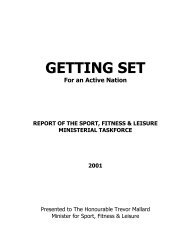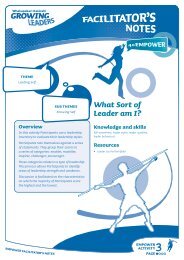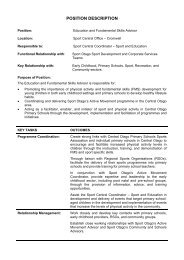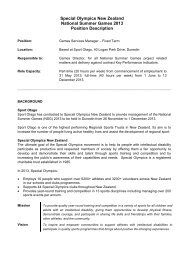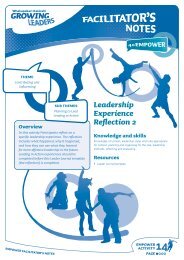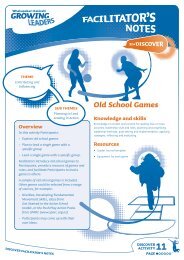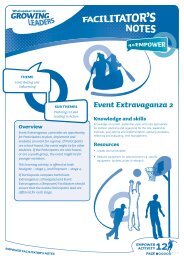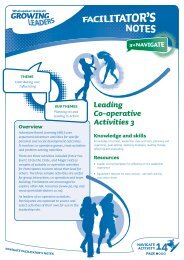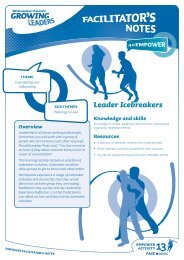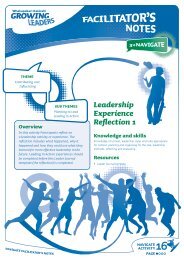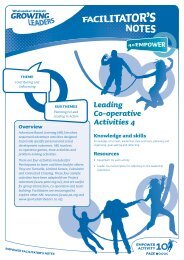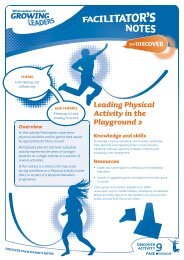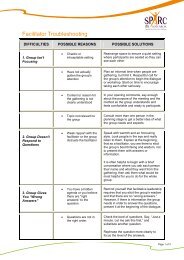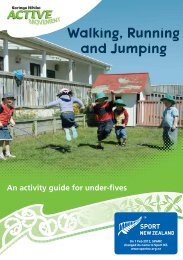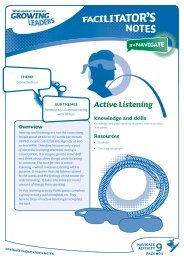The New Zealand Community Sport Coaching Plan 2012-2020
The New Zealand Community Sport Coaching Plan 2012-2020
The New Zealand Community Sport Coaching Plan 2012-2020
Create successful ePaper yourself
Turn your PDF publications into a flip-book with our unique Google optimized e-Paper software.
<strong>New</strong> <strong>Zealand</strong><br />
<strong>Community</strong> <strong>Sport</strong><br />
<strong>Coaching</strong> <strong>Plan</strong><br />
<strong>2012</strong>–<strong>2020</strong><br />
<strong>The</strong> Vision - “World leading<br />
community sport coaching at<br />
the heart of a sporting nation”<br />
NEW ZEALAND COMMUNITY SPORT COACHING PLAN <strong>2012</strong>-<strong>2020</strong><br />
JULY <strong>2012</strong>
CONTENTS<br />
1. INTRODUCTION ............................................................................................. 3<br />
2. CORE PRINCIPLES ........................................................................................ 5<br />
3. THE COACHING COMMUNITIES.................................................................... 8<br />
4. OUTCOMES AND SCOPE ............................................................................. 12<br />
5. THE GAME PLANS ...................................................................................... 15<br />
APPENDIX: NEW ZEALAND COACHING STRATEGY ..................................... 22<br />
2
COMMUNITY SPORT COACHING PLAN <strong>2012</strong>-<strong>2020</strong><br />
1. INTRODUCTION<br />
To understand this <strong>Community</strong> <strong>Sport</strong> <strong>Coaching</strong> <strong>Plan</strong> it is first necessary to understand<br />
where it sits within the overall planning structure for coaching in <strong>New</strong> <strong>Zealand</strong>.<br />
<strong>The</strong> recently produced <strong>New</strong> <strong>Zealand</strong> <strong>Coaching</strong> Strategy (see Appendix 1) sets out how<br />
<strong>Sport</strong> <strong>New</strong> <strong>Zealand</strong> and its key partners will develop a world class coaching environment<br />
across <strong>New</strong> <strong>Zealand</strong> over the next eight years. In doing so it builds upon and replaces<br />
the original <strong>New</strong> <strong>Zealand</strong> <strong>Coaching</strong> Strategy first published in 2004.<br />
<strong>New</strong> <strong>Zealand</strong><br />
<strong>Coaching</strong> Strategy<br />
<strong>Community</strong> <strong>Sport</strong><br />
<strong>Coaching</strong> <strong>Plan</strong><br />
High Performance<br />
<strong>Coaching</strong> <strong>Plan</strong><br />
While the strategy sets out the broad vision and philosophical basis for coaching in<br />
<strong>New</strong> <strong>Zealand</strong>, it also identifies the need to have two separate, but connected, coaching<br />
plans sitting beneath the strategy.<br />
<strong>The</strong> need to have two separate <strong>Coaching</strong> <strong>Plan</strong>s is driven out of the increasingly<br />
specialised requirements for coaching High Performance athletes in the modern era<br />
of professional sport. This need has already been recognised in <strong>New</strong> <strong>Zealand</strong> through<br />
the creation of High Performance <strong>Sport</strong> <strong>New</strong> <strong>Zealand</strong> (HPSNZ) as a separate entity and<br />
subsidiary to <strong>Sport</strong> <strong>New</strong> <strong>Zealand</strong>.<br />
<strong>The</strong>re is a fundamental difference between how the High Performance and <strong>Community</strong><br />
<strong>Sport</strong> <strong>Coaching</strong> <strong>Plan</strong>s will operate. In the High Performance area the focus is on a small<br />
number of identified coaches and the HPSNZ coaching consultants can work directly<br />
with these coaches. By way of contrast in the <strong>Community</strong> <strong>Sport</strong> area there are literally<br />
hundreds of thousands of coaches so the plan must instead focus on leading, enabling<br />
and investing in National <strong>Sport</strong>s Organisations so that they can establish and deliver<br />
quality coach development programs within their sports.<br />
What connects the two coaching plans is the central philosophy that underpins<br />
all coaching in <strong>New</strong> <strong>Zealand</strong>. That is the belief that good coaching is all about the<br />
participant or athlete and the process to deliver the support they need to enjoy their<br />
sport and fulfil their potential at whatever level that may be. To be able to deliver on<br />
this philosophy, <strong>New</strong> <strong>Zealand</strong> needs capable coaches at all stages of the participant<br />
and athlete pathway.<br />
This <strong>Community</strong> <strong>Sport</strong> <strong>Coaching</strong> <strong>Plan</strong> is designed primarily as an action plan for the key<br />
organisations responsible for delivering <strong>Community</strong> <strong>Sport</strong> – that is <strong>Sport</strong> NZ itself, the<br />
National <strong>Sport</strong>ing Organisations (NSOs) that govern organised sport across the country<br />
and the Regional <strong>Sport</strong>s Trusts (RSTs) who support these NSOs and deliver additional<br />
generic coaching programmes on a regional basis.<br />
3
While the plan specifically targets these key organisations, it also has great relevance<br />
to the wider community sport sector. It will prove of interest and provide guidance to<br />
the multitude of organisations and individuals that operate in the community sport<br />
coaching area including Regional <strong>Sport</strong>s Organisations (RSOs), sports clubs, secondary<br />
and primary schools, tertiary institutions, territorial authorities and of course the<br />
hundreds of thousands of community sport coaches who give up their time every week<br />
to help make <strong>New</strong> <strong>Zealand</strong> a great sporting nation.<br />
<strong>The</strong> plan is connected to <strong>Sport</strong> <strong>New</strong> <strong>Zealand</strong>’s overarching <strong>Community</strong> <strong>Sport</strong> Strategy<br />
2010-2015, and outlines how <strong>Community</strong> <strong>Sport</strong> Coaches and our <strong>Community</strong> <strong>Sport</strong><br />
<strong>Coaching</strong> Environment will contribute to our overall vision of ‘Enriching lives through<br />
sport – everyone, every day’.<br />
<strong>The</strong> plan is also aligned, through its coaching strategy and philosophy, to the <strong>New</strong><br />
<strong>Zealand</strong> High Performance <strong>Coaching</strong> <strong>Plan</strong> 2011-<strong>2020</strong>.<br />
Consultation<br />
Over 50 people have been interviewed or consulted during the process to inform this<br />
plan. <strong>The</strong>y were a representation of the following key groups:<br />
• NSO <strong>Coaching</strong> Directors<br />
• RST <strong>Coaching</strong> Managers<br />
• RSO <strong>Coaching</strong> staff<br />
• Tertiary institution coaching experts<br />
• <strong>Community</strong> <strong>Sport</strong> Coaches<br />
• <strong>Sport</strong> <strong>New</strong> <strong>Zealand</strong> <strong>Community</strong> <strong>Sport</strong> team<br />
• High Performance <strong>Sport</strong> <strong>New</strong> <strong>Zealand</strong> <strong>Coaching</strong> Team<br />
<strong>The</strong> process included 1:1 interviews, working groups and written feedback.<br />
44
COMMUNITY SPORT COACHING PLAN <strong>2012</strong>-<strong>2020</strong><br />
2. CORE PRINCIPLES<br />
VISION<br />
World leading community<br />
sport coaching at the heart of a<br />
sporting nation<br />
MISSION<br />
To inspire and enable community<br />
sport coaches to provide<br />
participants and athletes with the<br />
coaching they need<br />
Fundamental Beliefs<br />
<strong>The</strong>se beliefs underpin this plan. Our Game <strong>Plan</strong>s and tactics are driven by, and aligned<br />
to, these beliefs.<br />
THE<br />
CORNERSTONE<br />
COACHING IN<br />
THE WIDER<br />
CONTEXT<br />
COACH<br />
DEVELOPMENT<br />
COACHING<br />
SYSTEMS<br />
1. <strong>Coaching</strong> should focus first and foremost on the needs of<br />
the participant or athlete being coached<br />
2. Good coaching is one of the key factors in retaining people<br />
in sport<br />
3. <strong>Community</strong> sport coaching is a positive force in fostering a<br />
healthy society<br />
4. Good community coaches have a huge positive impact on<br />
the development of young <strong>New</strong> <strong>Zealand</strong>ers<br />
5. Most community sport coaches are volunteers and need to<br />
be valued as such<br />
6. <strong>The</strong>re are three broad categories of community coaching<br />
– foundation, development and performance coaching<br />
– that align with the <strong>New</strong> <strong>Zealand</strong> <strong>Sport</strong> and Recreation<br />
Participant and Athlete Pathway<br />
7. Coaches should be able to develop and specialise within<br />
each of these coaching communities<br />
8. <strong>The</strong> best learning comes through experience and continual<br />
development opportunities<br />
9. <strong>Sport</strong> leads sport - It is the responsibility of each National<br />
<strong>Sport</strong>s Organisation to plan and organise the delivery of<br />
their coach development programme<br />
10. Effective delivery of coaching through community sport<br />
requires collaboration and alignment between <strong>Sport</strong> NZ,<br />
NSOs, RSOs, RSTs, Territorial Authorities, Tertiary<br />
Institutions, clubs and schools<br />
11. Effective coaching at the community sport level drives<br />
sustainable growth in participation and provides a platform<br />
to develop high performance athletes and coaches<br />
5
Core Definitions<br />
What do we mean by <strong>Community</strong> <strong>Sport</strong> Coaches?<br />
<strong>The</strong> key platform of the <strong>New</strong> <strong>Zealand</strong> <strong>Coaching</strong> Strategy is that all coaching should<br />
focus first and foremost on the needs of the participant or athlete being coached.<br />
“Coaches would have no reason to exist without<br />
participants or athletes to coach.”<br />
<strong>The</strong> <strong>New</strong> <strong>Zealand</strong> <strong>Sport</strong> and Recreation Participant and Athlete Pathway<br />
below, sets out five clear but interlinked stages of participant and athlete development.<br />
Participants at different stages within this pathway will have different coaching needs and<br />
for that reason the NZ <strong>Coaching</strong> Strategy has advocated the establishment of four coaching<br />
communities that will specialise at different stages of participant and athlete development.<br />
1. Foundation <strong>Coaching</strong> <strong>Community</strong><br />
(Supporting participants in the Learn stage)<br />
Foundation coaches support participants enjoying their first experiences in organised<br />
sport. <strong>The</strong> vast majority of the participants will be primary school aged children<br />
trying out a range of modified sports in either a club or primary school setting.<br />
2. Development <strong>Coaching</strong> <strong>Community</strong><br />
(Supporting participants in the Participate stage)<br />
Development coaches support a wider range of participants including the young<br />
people who continue in organised sport through the later years of primary school,<br />
the secondary school students in both the school and club setting and the adults<br />
who continue to play organised sport in a non-elite environment.<br />
6
COMMUNITY SPORT COACHING PLAN <strong>2012</strong>-<strong>2020</strong><br />
3. Performance <strong>Coaching</strong> <strong>Community</strong><br />
(Supporting athletes in the Perform Stage)<br />
Performance coaches support that narrower range of athletes who have shown<br />
extra ability and have moved on to some sort of district or regional representative<br />
sport at either a youth or adult level.<br />
4. High Performance <strong>Coaching</strong> <strong>Community</strong><br />
(Supporting athletes in the Excel Stage)<br />
High Performance coaches support the athletes who have progressed to the top<br />
of their sport within <strong>New</strong> <strong>Zealand</strong> and are now competing on an international stage.<br />
<strong>The</strong>re are no firm lines of separation between these coaching communities and some<br />
coaches will indeed operate across a range of the communities during their coaching<br />
life. But the communities do offer a useful tool to help define what we mean by a<br />
community sport coach and also to develop and implement strategies that will help<br />
coaches within each community develop to their full potential. By doing so these<br />
coaches will be able to offer the appropriate support and guidance to the participants<br />
and athletes they coach.<br />
This <strong>Community</strong> <strong>Sport</strong> <strong>Coaching</strong> <strong>Plan</strong> has been established to provide the coaching<br />
support needed for participants through the Learn, Participate and Perform stages.<br />
<strong>The</strong> NZ High Performance <strong>Coaching</strong> <strong>Plan</strong> has been established to provide the necessary<br />
coaching support for athletes in the Excel stage in certain identified sports.<br />
Young children in the Explore stage should be enjoying unstructured play as opposed to<br />
organised sport and as such formal sports coaching is neither required nor recommended.<br />
7
3. THE COACHING COMMUNITIES<br />
<strong>The</strong> Foundation <strong>Coaching</strong> <strong>Community</strong><br />
<strong>The</strong> participants they coach<br />
Foundation coaches support participants in the Learn stage enjoying their first experiences<br />
in organised sport. <strong>The</strong> vast majority of the participants will be primary school aged<br />
children trying out a range of modified sports in either a club or primary school setting.<br />
Who the coaches are<br />
Foundation coaches can come from anywhere – it’s not about ‘who’ you are but rather<br />
whether you understand and care about the development of young Kiwis.<br />
Typically Foundation Coaches are<br />
• Parents<br />
• Primary school teachers<br />
• Regional <strong>Sport</strong> Development Officers<br />
• Older secondary school students<br />
• Tertiary students<br />
• Private providers<br />
<strong>The</strong> ideal Foundation Coach will<br />
• Nurture a love of sport and active recreation<br />
• Focus primarily on fun, participation and skill development<br />
• Understand the needs of young participants in the Learn Stage – primarily<br />
primary school age children<br />
• Encourage multiple sports and skills<br />
• Introduce the concept of fair play<br />
• Understand that they are in the business of creating not only<br />
better young athletes, but better young people<br />
• Have a sense of working in a wider<br />
coaching community with similar goals<br />
8
COMMUNITY SPORT COACHING PLAN <strong>2012</strong>-<strong>2020</strong><br />
<strong>The</strong> Development <strong>Coaching</strong> <strong>Community</strong><br />
<strong>The</strong> participants they coach<br />
Development coaches support a wider range of participants including the children who<br />
continue in organised sport through the later years of primary school, the secondary<br />
school students in both the school and club setting and the adults who continue to<br />
play organised sport in a non-elite environment.<br />
Who the coaches are<br />
Development coaches can come from anywhere – it’s not about ‘who’ you are but<br />
rather whether you understand and care about the development of Kiwi youth and<br />
adult non-elite participants in sport.<br />
Typically Development Coaches are<br />
• Parents<br />
• Primary and Secondary school teachers<br />
• Club Coaches<br />
• Regional <strong>Sport</strong>s Development Officers<br />
• Older secondary school students<br />
• Tertiary students<br />
<strong>The</strong> ideal Development Coach will<br />
• Nurture a love of multiple sports<br />
• Focus on skill development and decision making<br />
• Understand the needs of participants in the Participate phase – primarily<br />
intermediate and secondary school children and adult non-elite participants<br />
• Reinforce ethical approaches to sport and recreation<br />
• Provide for participants need and aspirations<br />
• Understand that they are in the business of creating not only better<br />
athletes, but better people<br />
• Have a sense of working in a wider coaching community with similar goals<br />
9
<strong>The</strong> Performance <strong>Coaching</strong> <strong>Community</strong><br />
<strong>The</strong> athletes they coach<br />
Performance coaches support that narrower range of athletes who have shown extra<br />
ability and have moved on to some sort of district or regional representative sport at<br />
either a youth or adult level.<br />
Who the coaches are<br />
Performance Coaches require considerable coaching experience and a high degree of<br />
knowledge within their sport. <strong>The</strong>y are often in part time professional roles where they<br />
are contracted by Regional or National <strong>Sport</strong>s Organisations<br />
Typically Performance Coaches are<br />
• Experienced development coaches who have shown ability in coaching<br />
more talented athletes<br />
• Former elite players who have shown a desire to become involved in coaching<br />
• Former high performance coaches who no longer have the time to be<br />
involved at a High Performance level<br />
• Professionals who coach for a living<br />
<strong>The</strong> ideal Performance Coach will<br />
• Nurture a love of competing and being the best you can be<br />
• Focus on skill development and decision making in a competitive environment<br />
• Understand the needs of athletes in the Perform phase – primarily youth<br />
and senior athletes competing at representative level<br />
• Help athletes develop a wider sense of sporting ethics<br />
• Provide appropriate sequenced development opportunities and guidance<br />
• Understand that they are in the business of creating not only better<br />
athletes, but better people and role models for younger participants<br />
• Have a sense of working in a wider coaching community with similar goals<br />
10<br />
10
COMMUNITY SPORT COACHING PLAN <strong>2012</strong>-<strong>2020</strong><br />
<strong>The</strong> Relationship between Performance and<br />
High Performance <strong>Coaching</strong><br />
Throughout this plan when we refer to a community sport coach we are referring to a<br />
coach within one or more of the foundation, development or performance coaching<br />
communities. Coaches within the High Performance <strong>Community</strong> will be supported<br />
separately through the NZ High Performance <strong>Coaching</strong> <strong>Plan</strong>.<br />
It is worth noting that the common use of the term ‘High Performance’ has<br />
traditionally been given a reasonably wide definition within <strong>New</strong> <strong>Zealand</strong> <strong>Sport</strong>. With<br />
the creation of High Performance <strong>Sport</strong> <strong>New</strong> <strong>Zealand</strong> this term has been now been<br />
given a more narrow definition and this is reflected in the four coaching communities<br />
within the NZ <strong>Coaching</strong> Strategy.<br />
Many coaches who were previously classified as ‘High Performance’ by either their<br />
sport or themselves are now more correctly classified as “Performance Coaches’. This in<br />
no way indicates any perceived lessening of their ability or the value of the work they<br />
do, but instead merely indicates where they sit within the wider coaching spectrum<br />
and the community from which they will most likely to be able to draw support.<br />
Continuous Development within <strong>Coaching</strong> Communities<br />
An important consequence of using the concept of coaching communities is to provide<br />
the opportunity for coaches to seek continual development and become world class<br />
within their community. This builds upon the NZ <strong>Coaching</strong> Strategy philosophy of<br />
encouraging coaches to specialise and continually develop their skills regardless of<br />
which coaching community they work within.<br />
Continuous Formal and Informal Learning<br />
Performance<br />
<strong>Coaching</strong><br />
<strong>Community</strong><br />
Beginning<br />
Coach<br />
Increasing<br />
Effectiveness<br />
Mentoring or<br />
Expert Coach<br />
Development<br />
<strong>Coaching</strong><br />
<strong>Community</strong><br />
Beginning<br />
Coach<br />
Increasing<br />
Effectiveness<br />
Mentoring or<br />
Expert Coach<br />
Foundation<br />
<strong>Coaching</strong><br />
<strong>Community</strong><br />
Beginning<br />
Coach<br />
Increasing<br />
Effectiveness<br />
Mentoring or<br />
Expert Coach<br />
– Formal Learning: NSO and RST coach development modules<br />
– Informal Learning: Seminars, conferences, self-learning, mentoring, interactions<br />
with other coaches, on-job learning etc.<br />
11
4. OUTCOMES AND SCOPE<br />
Defining Success – what a world leading community sport coaching environment<br />
looks like<br />
This plan will be successful if by <strong>2020</strong> if we have<br />
• Greater recognition - <strong>Community</strong> sport coaching is valued and<br />
understood as a central part of our sporting culture and given sufficient<br />
priority and resourcing at all stages of our sport delivery system<br />
• Better coaches - National <strong>Sport</strong>ing Organisations have in place a clear<br />
coach development framework that aligns with their participant and<br />
athlete pathway and enables coaches to continually develop within their<br />
coaching communities<br />
• More coaches - <strong>Sport</strong>s recruit and retain a sufficient number of coaches in<br />
each community to service their participant and athlete needs<br />
• A positive community sport environment - <strong>Coaching</strong> provides strong<br />
leadership in creating a positive and ethical community sport environment<br />
in <strong>New</strong> <strong>Zealand</strong><br />
<strong>The</strong> call to action<br />
To provide clear direction and measure progress a Game <strong>Plan</strong> has been developed<br />
for each of these four outcomes. Each Game <strong>Plan</strong> has specific Tactics and Actions<br />
that will be undertaken to deliver on each outcome. <strong>The</strong> Game <strong>Plan</strong>s also contain Key<br />
Performance Indicators that will be used to measure progress.<br />
While this <strong>Community</strong> <strong>Coaching</strong> <strong>Plan</strong> stretches through until <strong>2020</strong>, a full review will be<br />
conducted in 2015 to measure progress against each Game <strong>Plan</strong>.<br />
<strong>The</strong> Scope of this plan<br />
<strong>The</strong> ability of <strong>Sport</strong> NZ to invest in and work closely with a wide number of sports is<br />
restrained by limited resources. Similarly the ability of individual NSOs to develop and<br />
implement comprehensive coaching plans is also restrained by their respective size and<br />
resource base.<br />
While this is a <strong>Community</strong> <strong>Sport</strong> <strong>Coaching</strong> <strong>Plan</strong> for all sports, the initial focus of the<br />
Game <strong>Plan</strong>s will be on key community sports that have been identified by <strong>Sport</strong> NZ due<br />
to their high level of participation or exposure at a community level.<br />
12
COMMUNITY SPORT COACHING PLAN <strong>2012</strong>-<strong>2020</strong><br />
In <strong>2012</strong> these sports are Rugby, Rugby League, Netball, Cricket, Gymsports, Hockey,<br />
Football, Basketball, Tennis, Bike, Athletics, Golf, Triathlon and Bowls, but during the<br />
course of this plan the number and nature of sports will be reviewed periodically.<br />
While the primary focus is initially on these 14 sports, the resources and guidelines<br />
produced under this plan will be designed for the use of all National <strong>Sport</strong>ing<br />
Organisations.<br />
<strong>Sport</strong> Delivery System - Roles and Responsibilities<br />
<strong>The</strong> vast majority of community sport coaching takes place in a club or school<br />
environment and involves local coaches supporting local participants. This plan<br />
provides guidance to <strong>Sport</strong> <strong>New</strong> <strong>Zealand</strong> as to how they can most effectively promote<br />
the recruitment, development and retention of these coaches within the wider sporting<br />
sector.<br />
This can only happen through the wider sporting sector working together and the<br />
various layers of sporting organisations understanding their respective roles and<br />
responsibilities in the area of coaching.<br />
Participants<br />
and Athletes<br />
Coaches<br />
Events<br />
Clubs<br />
Schools<br />
Territorial<br />
Authorities<br />
RSOs<br />
RSTs<br />
Tertiary<br />
Institutions<br />
NSOs<br />
<strong>Sport</strong> NZ<br />
13
Organisation<br />
<strong>Sport</strong> <strong>New</strong> <strong>Zealand</strong><br />
(<strong>Sport</strong> NZ)<br />
National <strong>Sport</strong>ing<br />
Organisations (NSOs)<br />
Regional <strong>Sport</strong>s<br />
Organisations (RSOs)<br />
Regional <strong>Sport</strong>s Trusts<br />
(RSTs)<br />
Tertiary Institutions<br />
Territorial Authorities<br />
Clubs<br />
Schools<br />
Core Responsibilities<br />
- To lead , enable and invest in National <strong>Sport</strong>ing Organisations and<br />
Regional <strong>Sport</strong>s Trusts to ensure they have in place suitable coach<br />
management personnel and national coaching plans that align with<br />
<strong>Sport</strong> NZ, HPSNZ and the NZ <strong>Coaching</strong> Strategy<br />
- To research, coordinate and provide generic coaching best practice<br />
guidelines, templates and coaching knowledge to the wider<br />
coaching sector at all levels<br />
- To lead, enable and invest in their Regional <strong>Sport</strong> Organisations<br />
(RSOs) to ensure they have in place suitable coaching personnel and<br />
regional coaching plans that align with their NSO<br />
- To research, coordinate and provide sport specific coaching best<br />
practice guidelines, templates and coaching knowledge to the wider<br />
coaching sector within their sport at all levels<br />
- To lead, enable and invest in their local clubs and schools to ensure<br />
they have in place suitable coaching personnel and club coaching<br />
plans that align with their RSO<br />
- To adapt their NSO’s generic and sport specific coaching best<br />
practice guidelines, templates and coaching knowledge to suit their<br />
regional needs<br />
- To support RSOs in delivering their coaching responsibilities within<br />
their region<br />
- To adapt <strong>Sport</strong> NZ’s generic coaching best practice guidelines,<br />
templates and coaching knowledge to support RSOs, clubs and<br />
schools within their region<br />
- To support the sector through targeted research and provision of<br />
education and training opportunities<br />
- To support the sector through the provision of facilities and<br />
partnering in targeted projects<br />
- To recruit, develop and retain the coaches needed to support the<br />
participant and athlete demand in their club<br />
- To recruit, develop and retain the coaches needed to support the<br />
participant and athlete demand in their school<br />
14
COMMUNITY SPORT COACHING PLAN <strong>2012</strong>-<strong>2020</strong><br />
5. THE GAME PLANS<br />
Game <strong>Plan</strong> One<br />
Outcome Sought<br />
Greater Recognition - <strong>Community</strong> sport coaching is valued and understood as a<br />
central part of our sporting culture and given sufficient priority and resourcing at all<br />
stages of our sport delivery system.<br />
Key Performance Indicators<br />
• Increased level of <strong>Community</strong> <strong>Sport</strong> coaching resourcing committed by the<br />
key community sports over the period of plan<br />
Measure used<br />
• <strong>The</strong> aggregated level of FTE coach development positions at NSO, RSO and<br />
RST level across key community sports over the period of the plan<br />
Tactics Actions Role Date<br />
1.<br />
<strong>Sport</strong> NZ to<br />
promote an<br />
understanding<br />
within the<br />
wider sporting<br />
community of<br />
the NZ <strong>Coaching</strong><br />
Strategy and the<br />
<strong>Community</strong> <strong>Sport</strong><br />
<strong>Coaching</strong> <strong>Plan</strong><br />
1.1 Completion and publication of <strong>New</strong> <strong>Zealand</strong> <strong>Community</strong> <strong>Sport</strong><br />
<strong>Coaching</strong> <strong>Plan</strong> and <strong>New</strong> <strong>Zealand</strong> <strong>Coaching</strong> Strategy.<br />
<strong>Sport</strong> NZ<br />
30 September<br />
<strong>2012</strong><br />
1.2 Redevelopment of coaching section of <strong>Sport</strong> NZ website. <strong>Sport</strong> NZ 30 March<br />
2013<br />
1.3 Creation of communication plan for new coaching plans and delivery of<br />
this plan to key stakeholders and relevant forums within sector.<br />
<strong>Sport</strong> NZ<br />
30 September<br />
<strong>2012</strong><br />
1.4 Investigate feasibility of staging of major ‘Coaches Conference’ in 2014. <strong>Sport</strong> NZ 30 April 2013<br />
2.<br />
<strong>Sport</strong> NZ and each<br />
sport to provide<br />
appropriate<br />
resourcing to<br />
community sport<br />
coach development<br />
at a national level<br />
2.1 Annual review of nature of <strong>Sport</strong> NZ investment into NSO <strong>Coaching</strong><br />
Directors and clarification of expectations across the key community<br />
sports.<br />
2.2 Annual review of level of actual Coach Management resourcing in the<br />
key community sports.<br />
<strong>Sport</strong> NZ<br />
<strong>Sport</strong> NZ<br />
/ NSO<br />
<strong>Coaching</strong><br />
Directors<br />
May annually<br />
June annually<br />
2.3 Annual meeting by <strong>Sport</strong> NZ CA with CEO, <strong>Community</strong> <strong>Sport</strong> Manager<br />
and <strong>Coaching</strong> Director in the key community sports to discuss coach<br />
resources.<br />
<strong>Sport</strong> NZ/<br />
NSOs<br />
Schedule<br />
spread over<br />
year<br />
15
Tactics Actions Role Date<br />
3.<br />
Each sport to<br />
have in place an<br />
effective regional<br />
delivery system for<br />
community sport<br />
coaching<br />
3.1 Annual review of the current level of Coach Management resourcing<br />
in RSOs of the key community sports.<br />
3.2 Full review of Coachforce, <strong>Sport</strong>s Force and other regional delivery<br />
models in <strong>2012</strong> with a view to establishing best practice regional<br />
delivery guidelines.<br />
<strong>Sport</strong> NZ/<br />
NSO <strong>Coaching</strong><br />
Directors<br />
<strong>Sport</strong> NZ<br />
June annually<br />
30 November<br />
<strong>2012</strong><br />
3.3 Investigation of additional funding sources to support regional<br />
coaching personnel and the best role for RSTs to play in this area.<br />
<strong>Sport</strong> NZ<br />
Ongoing<br />
4.<br />
Each RST to<br />
provide effective<br />
support to the<br />
regional delivery<br />
system of the key<br />
community sports<br />
3.4 Sharing of best practice RSO delivery systems between all NSOs. <strong>Sport</strong> NZ/<br />
NSO <strong>Coaching</strong><br />
Directors<br />
4.1 Annual review of the current level of Coach Management resourcing<br />
in all RSTs.<br />
<strong>Sport</strong> NZ<br />
4.2 Establish menu of ‘<strong>Coaching</strong> Support’ RSTs can offer to RSOs. <strong>Sport</strong> NZ/<br />
RST Coach<br />
Managers<br />
4.3 Ensure clarity around the coaching support initiatives offered by each<br />
RST to the RSOs of the key community sports under their <strong>Community</strong><br />
<strong>Sport</strong> Support <strong>Plan</strong>.<br />
<strong>Sport</strong> NZ/<br />
RST Coach<br />
Managers<br />
Ongoing<br />
July annually<br />
30 September<br />
<strong>2012</strong><br />
June annually<br />
4.4 Clarify the role of RSTs in providing generic cross-sport coaching<br />
initiatives to support and supplement the sports specific coach<br />
development offered by all NSOs.<br />
<strong>Sport</strong> NZ<br />
30 November<br />
<strong>2012</strong><br />
16
COMMUNITY SPORT COACHING PLAN <strong>2012</strong>-<strong>2020</strong><br />
Game <strong>Plan</strong> Two<br />
Outcome Sought<br />
Better coaches - National <strong>Sport</strong>ing Organisations have in place a clear coach<br />
development plan and framework that aligns with their participant and athlete<br />
pathway and enables coaches to continually develop within their coaching<br />
communities.<br />
Key Performance Indicators<br />
80% of the key community sports have<br />
• An effective coach development framework and plan in place<br />
• Delivered their targeted number of coach development opportunities<br />
Measure used<br />
• <strong>The</strong> number of the key community sports coaching plans and development<br />
framework resources endorsed by <strong>Sport</strong> NZ<br />
• <strong>The</strong> number of coach development opportunities delivered<br />
by the key community sports<br />
Tactics Actions Role Date<br />
1.<br />
<strong>Coaching</strong> <strong>Plan</strong>s<br />
and Frameworks<br />
developed by<br />
NSOs<br />
1.1 <strong>Sport</strong> NZ to update the existing NZ Coach Development<br />
Framework.<br />
1.2 All NSOs to have <strong>Coaching</strong> Frameworks in place aligned to<br />
their athlete pathway.<br />
<strong>Sport</strong> NZ 30 March 2013<br />
NSO <strong>Coaching</strong><br />
Directors<br />
30 December <strong>2012</strong><br />
1.3 All NSOs to have in place <strong>Coaching</strong> <strong>Plan</strong>s setting out<br />
the national to local delivery system of their <strong>Coaching</strong><br />
Framework.<br />
NSO <strong>Coaching</strong><br />
Directors<br />
30 December <strong>2012</strong><br />
1.4 <strong>The</strong> key community sports to have in place a coaching<br />
advisory group.<br />
NSO <strong>Coaching</strong><br />
Directors<br />
30 December <strong>2012</strong><br />
1.5 ‘Coachmark Scorecard’ developed and reviewed with the key<br />
community sports annually.<br />
<strong>Sport</strong> NZ/NSO<br />
<strong>Coaching</strong> Directors<br />
Schedule spread<br />
over year<br />
2.<br />
All NSOs<br />
offer practical<br />
development<br />
opportunities<br />
to coaches in<br />
each coaching<br />
community<br />
to meet their<br />
development<br />
goals<br />
2.1 All NSOs to align development modules with coaching<br />
communities.<br />
2.2 <strong>The</strong> key community sports to have an established ‘Facilitator<br />
Training Programme’ in place and to hit targets set for annual<br />
facilitator training.<br />
2.3 <strong>The</strong> key community sports to have an established ‘Mentor<br />
Programme’ in place and to meet annual targets for mentor<br />
training.<br />
NSO <strong>Coaching</strong><br />
Directors/<strong>Sport</strong> NZ<br />
NSO <strong>Coaching</strong><br />
Directors/<strong>Sport</strong> NZ<br />
NSO <strong>Coaching</strong><br />
Directors/<strong>Sport</strong> NZ<br />
30 February 2013<br />
30 March 2013<br />
30 May 2013<br />
2.4 <strong>The</strong> key community sports to have in place and to achieve<br />
a plan to complete the development of their coaching<br />
modules.<br />
NSO <strong>Coaching</strong><br />
Directors/<strong>Sport</strong> NZ<br />
30 December <strong>2012</strong><br />
2.5 <strong>The</strong> key community sports to hit needs based targets set for<br />
annual module delivery.<br />
NSO <strong>Coaching</strong><br />
Directors<br />
Schedule set over<br />
year for annual<br />
monitoring (winter /<br />
summer codes)<br />
17
Tactics Actions Role Date<br />
3.<br />
<strong>Sport</strong> NZ<br />
to facilitate<br />
the creation<br />
of coaching<br />
communities<br />
across the wider<br />
sporting sector<br />
3.1 Creation of National Advisory Groups at each <strong>Coaching</strong><br />
<strong>Community</strong> level.<br />
3.2 Re-focus of Online Coach magazine to help foster coaching<br />
communities.<br />
3.3 Establishment of annual coaching workshop and conference<br />
calendar.<br />
<strong>Sport</strong> NZ 30 November <strong>2012</strong><br />
then ongoing<br />
<strong>Sport</strong> NZ 30 August <strong>2012</strong><br />
then ongoing<br />
delivery<br />
<strong>Sport</strong> NZ/<br />
NSO <strong>Coaching</strong><br />
Directors/ RST<br />
Coach Managers<br />
30 October <strong>2012</strong><br />
then ongoing<br />
delivery<br />
3.4 Investigation of optimal national and regional coach<br />
recognition programmes within coaching communities.<br />
3.5 Establishment of ‘<strong>Coaching</strong> Technology’ Advisory Group to<br />
provide best practice guidance to NSOs and RSTs.<br />
<strong>Sport</strong> NZ/<br />
RST <strong>Coaching</strong><br />
Managers<br />
<strong>Sport</strong> NZ<br />
30 November<br />
<strong>2012</strong> then ongoing<br />
delivery<br />
30 November<br />
<strong>2012</strong> then ongoing<br />
delivery<br />
4.<br />
<strong>Sport</strong> NZ and<br />
all NSOs to<br />
have a clear<br />
understanding<br />
of the transition<br />
required<br />
between the<br />
Performance<br />
and High<br />
Performance<br />
communities<br />
4.1 <strong>Sport</strong> NZ and HPSNZ to work together to identify the<br />
challenges in the transition from Performance to High<br />
Performance <strong>Coaching</strong> Communities.<br />
4.2 All NSOs to develop sport specific coach development<br />
strategies to manage the transition between Performance<br />
and High Performance communities.<br />
4.3 <strong>Sport</strong> NZ, in consultation with RSTs, to identify generic<br />
cross-sport initiatives at a regional level to assist the<br />
transition.<br />
<strong>Sport</strong> NZ/HPSNZ 30 September <strong>2012</strong><br />
NSO <strong>Coaching</strong><br />
Directors/<strong>Sport</strong> NZ/<br />
HPSNZ<br />
<strong>Sport</strong> NZ/<br />
RST <strong>Coaching</strong><br />
Managers<br />
Ongoing<br />
Ongoing<br />
18
COMMUNITY SPORT COACHING PLAN <strong>2012</strong>-<strong>2020</strong><br />
Game <strong>Plan</strong> Three<br />
Outcome Sought<br />
More coaches - <strong>Sport</strong>s recruit and retain a sufficient number of coaches in each<br />
community to service their participant and athlete needs.<br />
Key Performance Indicators<br />
80% success rate of the key community sports in achieving needs based targets set<br />
annually for number of active coaches in each coaching community.<br />
Measure used<br />
<strong>The</strong> number of coaches in each coaching community within the key community sports.<br />
Tactics Actions Role Date<br />
1.<br />
<strong>Sport</strong> NZ<br />
offers practical<br />
leadership in the<br />
area of coach<br />
recruitment<br />
1.1 <strong>Sport</strong> NZ collates all existing materials produced regarding<br />
coach recruitment.<br />
1.2 <strong>Sport</strong> NZ completes an analysis of the stages at which<br />
coaches may be recruited.<br />
1.3 <strong>Sport</strong> NZ develops recommended recruitment strategies for<br />
each community.<br />
<strong>Sport</strong> NZ 30 March 2013<br />
<strong>Sport</strong> NZ 30 March 2013<br />
<strong>Sport</strong> NZ 30 May 2013<br />
1.4 <strong>Sport</strong> NZ develops a system where each year the best<br />
grass roots innovations around coach recruitment can be<br />
captured and shared.<br />
<strong>Sport</strong> NZ/RST<br />
Coach Managers<br />
30 September <strong>2012</strong><br />
then ongoing<br />
2.<br />
Each key<br />
community<br />
sport has a clear<br />
community sport<br />
coach recruitment<br />
plan in place<br />
2.1 <strong>The</strong> key community sports to establish baseline data<br />
regarding coach numbers in each coaching community.<br />
2.2 <strong>The</strong> key community sports to incorporate a clear<br />
recruitment section within their overall Coach <strong>Plan</strong>.<br />
2.3 Recruitment <strong>Plan</strong>s for each key community sports to<br />
be shared with RST network and support offered where<br />
feasible.<br />
NSO <strong>Coaching</strong><br />
Directors/<strong>Sport</strong> NZ<br />
NSO <strong>Coaching</strong><br />
Directors<br />
NSO <strong>Coaching</strong><br />
Directors/RST<br />
Coach Managers<br />
30 December <strong>2012</strong><br />
30 March 2013<br />
30 June 2013<br />
2.4 <strong>Sport</strong> NZ to conduct annual review of coach numbers in<br />
the key community sports in each coaching community.<br />
NSO <strong>Coaching</strong><br />
Directors<br />
Schedule set over<br />
year for annual<br />
monitoring (winter /<br />
summer codes)<br />
19
Tactics Actions Role Date<br />
3.<br />
Growing Coaches<br />
Programme<br />
established across<br />
the country<br />
3.1 <strong>Sport</strong> NZ to complete development of Growing Coaches<br />
Resources.<br />
<strong>Sport</strong> NZ 30 September <strong>2012</strong><br />
3.2 Targeted roll out to selected RSTs in <strong>2012</strong>. <strong>Sport</strong> NZ August – October<br />
<strong>2012</strong><br />
3.3 Close monitoring of delivery in 2013 and capturing of key<br />
learnings.<br />
3.4 Nationwide roll out in 2014 and 2015 and continued<br />
monitoring of results.<br />
<strong>Sport</strong> NZ/RST<br />
Coach Managers<br />
<strong>Sport</strong> NZ/<br />
RST <strong>Coaching</strong><br />
Managers<br />
Ongoing 2013<br />
Ongoing 2014 and<br />
2015<br />
4.<br />
Retention<br />
strategies<br />
developed for<br />
traditional drop<br />
off spots<br />
4.1 <strong>Sport</strong> NZ to identify if there are key ‘drop off points’ for<br />
coach retention across sport in general.<br />
4.2 <strong>Sport</strong> NZ to conduct audit of what sport specific strategies<br />
have been developed to address drop offs in the key<br />
community sports.<br />
4.3 <strong>Sport</strong> NZ to develop recommended retention strategies for<br />
each drop off point.<br />
4.4 <strong>Sport</strong> NZ develops a system where each year the best grass<br />
roots innovations around coach retention can be captured<br />
and shared.<br />
<strong>Sport</strong> NZ 30 March 2013<br />
<strong>Sport</strong> NZ/NSO<br />
<strong>Coaching</strong> Directors<br />
30 September <strong>2012</strong><br />
<strong>Sport</strong> NZ 30 May 2013<br />
<strong>Sport</strong> NZ 30 September <strong>2012</strong><br />
then ongoing<br />
20
COMMUNITY SPORT COACHING PLAN <strong>2012</strong>-<strong>2020</strong><br />
Game <strong>Plan</strong> Four<br />
Outcome Sought<br />
A positive community sport environment – <strong>Community</strong> sport coaches take a<br />
leadership role in creating a positive and ethical community sport environment in<br />
<strong>New</strong> <strong>Zealand</strong><br />
Key Performance Indicators<br />
• 80% of the key community sports adopt sideline behaviour guidelines in<br />
their Coach Development Modules<br />
• 80% of the key community sports develop and implement child protection<br />
policies<br />
Measure used<br />
• <strong>The</strong> number of the key community sports adopting sideline behavior<br />
guidelines and child protection policies<br />
Tactics Actions Role Date<br />
1.<br />
<strong>Community</strong> sport<br />
coaching to take<br />
a leadership role<br />
in promoting<br />
positive sideline<br />
behavior in all<br />
NSOs<br />
2.<br />
<strong>The</strong> key<br />
community sports<br />
to have in place<br />
child protection<br />
policies to ensure<br />
community sport<br />
coaches maintain<br />
appropriate<br />
ethical standards<br />
3.<br />
<strong>Sport</strong> NZ conducts<br />
research into best<br />
international<br />
practice in<br />
community sport<br />
coaching and<br />
disseminates<br />
relevant<br />
information<br />
1.1 <strong>Sport</strong> NZ to research and collate the best coaching<br />
practices in <strong>New</strong> <strong>Zealand</strong> and internationally to help<br />
address this behavior.<br />
1.2 <strong>Sport</strong> NZ to provide practical implementation guidelines to<br />
all NSOs on how to address this issue within their coaching<br />
system.<br />
1.3 All NSOs to adopt best practice guidelines and adapt as<br />
appropriate within their coach development materials.<br />
2.1 <strong>Sport</strong>s NZ to create practical guidelines on developing child<br />
protection policies.<br />
2.2 All NSOs to adopt child protection policies within their<br />
coach development systems.<br />
3.1 <strong>Sport</strong> NZ to maintain membership of the International<br />
Council for Coach Education(ICCE) and make active<br />
contribution on international stage.<br />
3.2 <strong>Sport</strong> NZ to establish relationships with other countries to<br />
review and compare coaching systems.<br />
3.3 Best practice international thinking to be made available to<br />
NZ coaches through <strong>Sport</strong> NZ website and special forums.<br />
<strong>Sport</strong> NZ 30 March 2013<br />
<strong>Sport</strong> NZ 30 May 2013<br />
NSO <strong>Coaching</strong><br />
Directors<br />
30 September 2013<br />
<strong>Sport</strong> NZ 30 May 2013<br />
<strong>Sport</strong> NZ 30 July 2013<br />
<strong>Sport</strong> NZ/HPSNZ 30 September <strong>2012</strong><br />
<strong>Sport</strong> NZ<br />
August – October<br />
<strong>2012</strong><br />
<strong>Sport</strong> NZ Ongoing 2013<br />
21
APPENDIX<br />
THE NEW ZEALAND COACHING STRATEGY<br />
CORE PRINCIPLES<br />
• Participant and Athlete Focused<br />
• Coaches are leaders<br />
• Continuous learning<br />
• Collaboration among coaches<br />
VISION<br />
“A world leading coaching environment that<br />
enables coaches to meet the needs of our<br />
community participants and our<br />
performance athletes”<br />
KEY OBJECTIVES<br />
• Coaches at all levels are valued and supported<br />
• <strong>Coaching</strong> communities are developed to meet<br />
participant and athlete needs<br />
• More and better coaches<br />
• A collaborative culture sustaining life long learning<br />
Delivered through aligned <strong>Community</strong> <strong>Sport</strong> and High Performance <strong>Coaching</strong> <strong>Plan</strong>s<br />
PERFORMANCE<br />
DEVELOPMENT<br />
PERFORM<br />
PARTICIPATE<br />
<strong>Community</strong> <strong>Sport</strong><br />
<strong>Coaching</strong> Game <strong>Plan</strong>s<br />
High Performance<br />
<strong>Coaching</strong> Game <strong>Plan</strong>s<br />
1 High Performance <strong>Coaching</strong><br />
is a viable and valued career<br />
THE HIGH PERFORMANCE<br />
COACHING PLAN<br />
HIGH PERFORMANCE<br />
PARTICIPANT<br />
EXCEL<br />
ATHLETE<br />
1 Greater Recognition<br />
– <strong>Community</strong> sport coaching<br />
is valued and understood<br />
2 Build a culture that sustains the<br />
development and performance<br />
of coaches in the long term<br />
LEARN<br />
FOUNDATION<br />
2 Better Coaches – continuous<br />
development within coaching<br />
communities<br />
THE COMMUNITY SPORT COACHING PLAN<br />
3 Increase coach capability<br />
PATHWAY<br />
3 More coaches<br />
4 Athlete focused coaching<br />
THE COACHING<br />
4 A positive <strong>Community</strong> <strong>Sport</strong><br />
environment<br />
COMMUNITIES<br />
THE OPERATIONAL<br />
PLANNING STRUCTURE<br />
22
COMMUNITY SPORT COACHING PLAN <strong>2012</strong>-<strong>2020</strong><br />
23



